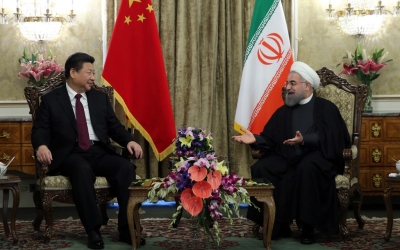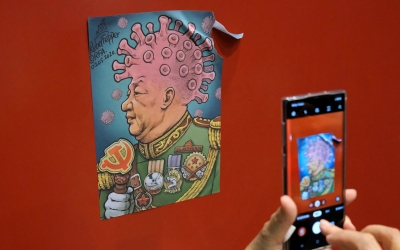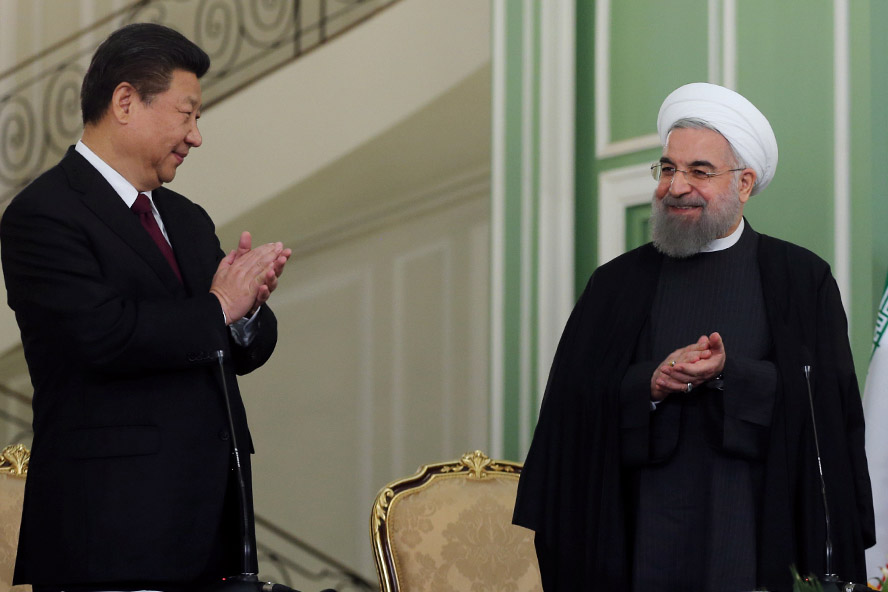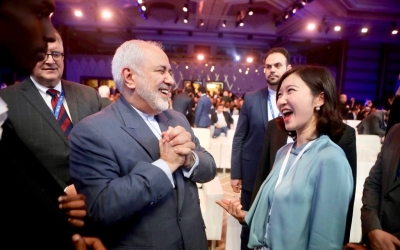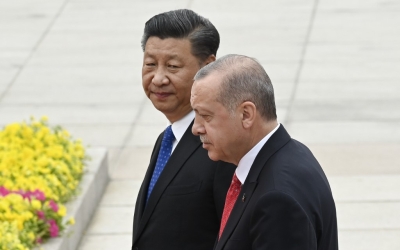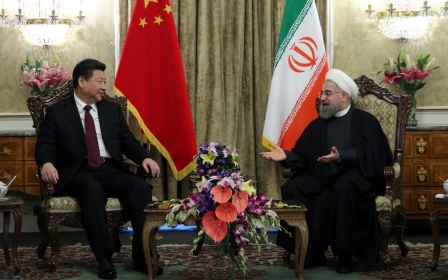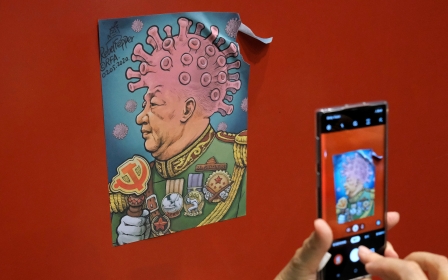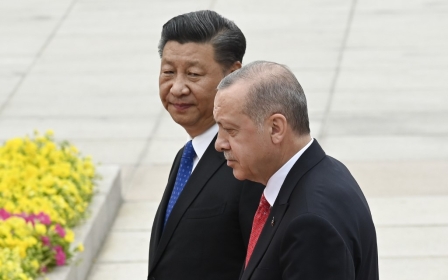Iran split over 25-year China plan still shrouded in mystery
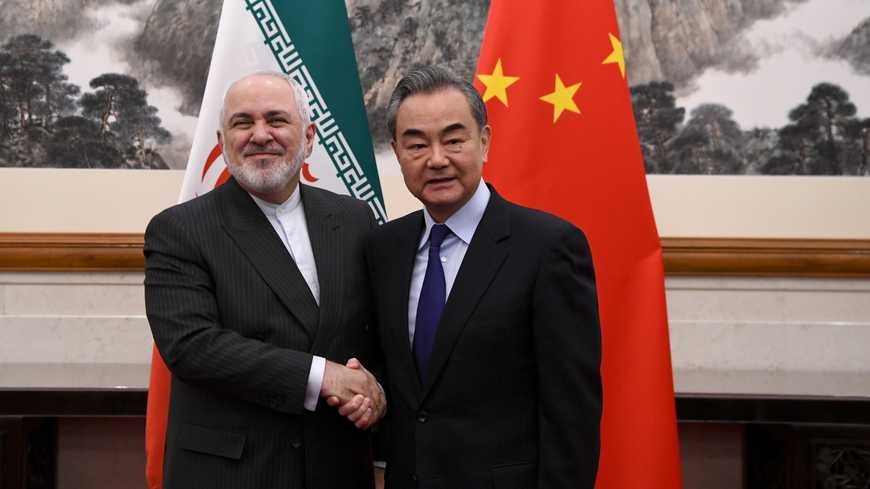
A landmark 25-year deal on economic and political cooperation between Iran and China has caused controversy and fierce debate in the Islamic Republic.
Following reports that the Iranian cabinet had given its approval to a draft of the plan last month, critics argued Tehran had agreed to a "colonial" deal that would allow China to plunder the country's natural resources and oil reserves.
Although Iran has not revealed the full details of the partnership, a report in September by the monthly magazine Petroleum Economist suggested that Iran is set to grant huge concessions to China, including significant discounts on oil and gas and the ability to delay payments for up to two years and to pay in soft currencies.
According to a senior source closely connected to Iran's petroleum ministry, who spoke to Petroleum Economist in late August, China would also be granted first refusal on opportunities to become involved with any petrochemicals projects in Iran.
China will invest $280bn developing Iran's oil, gas and petrochemicals sectors and another $120bn on upgrading the country's transport and manufacturing infrastructure.
The source said the deal would also provide for up to 5,000 Chinese security personnel on the ground to protect Chinese projects.
There were also rumours in Iran's media that Tehran had ceded Kish Island, which has free trade zone status, to Beijing.
Angry comments from Iranians lit up social media following news of the draft deal.
Some compared the plan to the Treaty of Turkmenchay, an infamous agreement between Iran and Russia signed in 1828, under which the Iranian monarchy handed a large part of its lands in the north to the Russian Empire.
Ahmadinejad attack
Fierce debate over the proposed cooperation plan first began on 27 June, when former Iranian president Mahmoud Ahmadinejad attacked the deal.
According to an article published on the pro-Ahmadinejad website Dolat-e Bahar, the ex-president told the people of Gilan province: "We have heard that they are negotiating and want to sign a new 25-year agreement with a foreign country, and no one knows about it.”
Ahmadinejad called it a suspicious, secretive deal that the people of Iran would not approve.
Iranian opposition groups in the diaspora have also voiced concerns about the plan, expressing their resistance to it and describing it as being "colonial".
However, a source with knowledge of the details of the plan told MEE that many of the reports about the deal were "ridiculous".
"The draft cooperation document is by no means a contract, and it only includes a 25-year cooperation programme about which there have been some suggestions made since the Chinese president visited Iran four years ago, and its details should be discussed," they said.
"Basically, this programme does not include any investment figures, nor does it say anything about the presence of Chinese troops in Iran, and the overtaking of Iranian military bases by them, nor anything about the transfer of some Iranian islands to China, etc."
Iranian Foreign Minister Mohammad Javad Zarif has been tasked with holding talks with the Chinese side about the details of the cooperation plan to prepare it for final approval.
"There is nothing to hide about the deal. Every stage has been transparent, and once it is finalised, the details will be made public," Zarif told lawmakers earlier this month as he was questioned over the deal.
"The point that has to be taken into consideration in our foreign policy is the shift in global power."
'China will gobble up Iran'
As it often true with issues in Iran, which is prone to being easily socially polarised, people's reactions to the announcement of the plan fell into two main categories.
Some welcomed closer relations with China as a positive development and as beneficial to Iran's economic interests, while others saw the deal as similar to the Treaty of Turkmenchay.
Reza Bagheri, an architecture student in Tehran, said: "They are selling off the country. China will gobble up Iran. They [the Chinese] will plunder everything."
When asked for any reasons for his comments, he said that he had not seen the proposed agreement yet but he was sure it would become a black stain in Iran's history.
In contrast, Fahimeh Abbasi, an IT expert working with a company in Tehran, saw nothing wrong with acquiring Chinese capital and technology through the agreement.
Abbasi told MEE: "In a balanced relationship based on national interests, Iran can benefit greatly, especially now that Europe and the United States have withdrawn from the Iranian market."
China wary of US
China's relations with Iran have been complicated in the last couple of years by the renewal of US sanctions against the Islamic Republic, and there are signs it does not want to antagonise Washington.
The US announced its withdrawal from the Joint Comprehensive Plan of Action (JCPOA), also known as the Iran nuclear deal, on 8 May 2018, and has instigated a "maximum pressure" policy against Tehran.
Deputy Foreign Minister for Economic Affairs Gholamreza Ansari has pointed out that China is currently the only country that buys oil from Iran. However, statistics show Beijing has sharply reduced such purchases and that its trade relations with Tehran have declined dramatically in recent years.
Esfandyar Batmanghelidj, a business diplomacy expert and the founder of Bourse & Bazaar, which reports on the latest developments in Iran, told MEE: "While China remains Iran's sole remaining oil customer, despite US sanctions, China-Iran bilateral trade has been impacted by the Trump administration's 'maximum pressure' policy.
"Chinese exports to Iran, which include important intermediate goods for Iran's manufacturing sector, have fallen from around $1.4bn per month in the first half of 2018 to around half that level in the last few months."
Lack of trust in government
Iran's economic problems, such as the unprecedented decline in the value of its currency, have made life very difficult for the majority of Iranians and added to public distrust of the government.
Addressing the reasons behind the plethora of negative reactions to the Iran-China cooperation plan, Hamidreza Azizi, a political commentator and visiting fellow at the German Institute for International and Security Affairs, told MEE: "When it comes to analysing this issue, it cannot be said with certainty that the majority of the people trust the West and distrust the East.
"The main problem is the lack of trust domestically, not internationally. At the moment, the public concern is that China will be given an unusual privilege if the terms of the deal are not clearly defined."
Other commentators have argued the reasons behind the negative reactions to the plan are rooted in history.
Sharareh Abdolhosseinzadeh, who holds a PhD in political sociology, told MEE: "In the history books in Iran, people constantly read that the kings handed over parts of the country such as Samarkand, Bukhara, Nakhchivan and the Caucasus, etcetera, in exchange for a loan, or the protection of the country against enemies.
"The Iranian negative opinion of foreign countries, be it Eastern or Western, due to their plundering of national resources and interests, can justify their irrational and unusual reactions."
Lengthy negotiations
Despite all the current controversy over the China-Iran plan, the final implementation of the deal may take months or even years of negotiations over its details.
An informed Iranian official told MEE: "This [draft] document contains nine clauses, each of which requires lengthy negotiations in order to become one or more treaties and agreements.
"It also includes three basic, general and non-detailed aspects: comprehensive
regional and international cooperation; defence and security cooperation, including the fight against terrorism and extremism; and comprehensive economic cooperation in the fields of energy, technology, infrastructure, transportation, etcetera.
Moreover, given China's highly economy-oriented foreign policy, some commentators have argued it is hard to imagine that Beijing will agree to build strategic relations with a country like Iran, which is engaged in numerous tensions with its neighbours and major western powers.
China has already signed several agreements with Arab countries and has deepened its trade ties with the Middle East within the framework of its Belt and Road initiative, while it has made no significant progress in its ties with Tehran.
"There is no doubt that the US's aggressive foreign policy has led Beijing to develop more regional and international alliances than ever before, and to adopt a more active foreign policy, but at least economically speaking, China has broad ties with the West which cannot be sacrificed for the sake of Iran," said Azizi.
"In other words, at both the societal and governmental levels, a meaningful development of relations with China is possible only if there is an overlapping strategy to improve ties with the West."
'Huge potential for growth'
Examining how China has treated Iran since the US administration adopted its "maximum pressure" policy may shed some light on the issue.
Since 2018, China has purchased very little oil from Iran, trade relations between the two countries have fallen sharply, and Chinese companies are not present in the Iranian market for fear of the US sanctions.
Batmanghelidj told MEE: "Chinese firms, including state enterprises, are obviously wary of increasing their exposure to Iran at a time of significant tensions with the Trump administration.
"The targeting of Huawei over its Iran operations has been a cautionary tale," he said, referring to the Chinese telecoms giant.
"However, there is huge potential for growth in China-Iran trade, and at the time of a global economic slowdown, Iran may actually become a more attractive market for China.
"There is no realistic scenario where China-Iran trade does not rebound in the medium-term."
Middle East Eye propose une couverture et une analyse indépendantes et incomparables du Moyen-Orient, de l’Afrique du Nord et d’autres régions du monde. Pour en savoir plus sur la reprise de ce contenu et les frais qui s’appliquent, veuillez remplir ce formulaire [en anglais]. Pour en savoir plus sur MEE, cliquez ici [en anglais].


